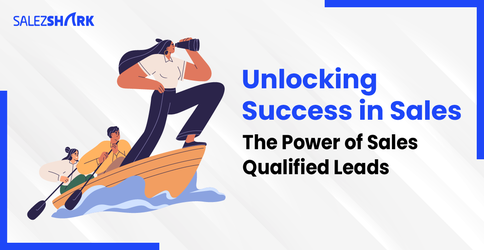In the realm of sales, leads are the lifeblood of any business. However, not all leads are created equal. To maximize your sales efforts and generate higher conversions, you need to focus on Sales Qualified Leads (SQLs). In this blog, we will explore what SQLs are, how to identify them, and why they are the key to driving revenue growth.
The Basics of Sales Qualified Leads (SQLs)
To truly appreciate the significance of SQLs, we must first understand what they are. A Sales Qualified Lead is a prospective customer who has shown a genuine interest in your product or service, and, crucially, has demonstrated the potential to make a purchase. These leads have progressed further down the sales funnel compared to Marketing Qualified Leads (MQLs), who are typically at an earlier stage of their buyer’s journey.
Identifying SQLs
Identifying SQLs, or Sales Qualified Leads, requires a multi-faceted approach that combines data analysis and engagement evaluation. Several critical criteria help in the identification of SQLs. SQLs demonstrate explicit interest by actively expressing interest in your product or service, which can manifest as direct inquiries, demo requests, or subscribing to your newsletter. They are a suitable fit for your offering, with their needs aligning with your solutions, representing your target industry, having the budget for your product or service, and matching your ideal customer profile. Their engagement level is notable, as they engage with your content and marketing materials consistently, such as by downloading eBooks, attending webinars, or interacting with your website. Furthermore, the element of timing plays a pivotal role, as SQLs are typically in the active consideration phase with a specific timeframe in mind for making a decision. Lastly, many SQLs possess decision-making authority or wield influence within their organization, enabling them to authorize purchases or influence others to do so.
The Importance of SQLs
Now that we know what SQLs are and how to identify them, let’s delve into why they are so vital for sales success.
1. Efficiency
Focusing on SQLs allows your sales team to use their time and resources more efficiently. Rather than chasing down every lead, they can concentrate on those with the highest likelihood of converting.
2. Improved Conversion Rates
SQLs have a higher conversion rate compared to MQLs or general leads. By nurturing SQLs, you can significantly boost your conversion rates.
3. Higher ROI
Your Return on Investment (ROI) increases when you target the right audience. Concentrating on SQLs means you are investing your sales efforts where they are most likely to yield results.
4. Shorter Sales Cycle
Since SQLs are further along in their decision-making process, your sales cycle becomes shorter. This means quicker revenue generation and less resource expenditure.
5. Enhanced Customer Satisfaction
SQLs are more likely to be genuinely interested in your offering, resulting in satisfied customers who find real value in your product or service.
Strategies for Nurturing SQLs
Nurturing SQLs (Sales-qualified leads) is vital for converting them into loyal customers. Effective strategies for this include personalized communication, tailoring messages to their needs and interests, ensuring content is relevant to their buyer’s journey stage, maintaining regular follow-ups without being overly pushy, hosting educational webinars and workshops to provide value and build authority, offering special discounts as incentives, and soliciting feedback to improve the sales process and demonstrate your appreciation for their input.
Measuring the Success of SQLs
To gauge the effectiveness of your efforts in generating and nurturing SQLs, it’s essential to assess their performance. Several key metrics should be monitored: Firstly, the Conversion Rate, which indicates the proportion of SQLs successfully transformed into paying customers. Secondly, Sales Velocity, revealing the pace at which SQLs progress through the sales pipeline. Thirdly, the Customer Lifetime Value, offering insights into the lasting value of SQLs who become devoted customers, thus reflecting SQL quality. Fourth, Sales and Revenue Growth should be tracked to measure the overall increase in sales and revenue, with a specific focus on contributions from SQLs. Lastly, the Churn Rate among converting SQLs should be closely watched, as a high churn rate may signify a need for enhancements in SQL quality.
Challenges in Handling SQLs
Dealing with SQLs (Sales Qualified Leads) is undeniably advantageous, yet it comes with certain challenges. First, there’s the potential pitfall of over-qualification, where excessive strictness in lead criteria may result in missed opportunities. Second, managing SQLs effectively demands a well-structured approach, often necessitating the utilization of Customer Relationship Management (CRM) software. Lastly, seamless handling of SQLs necessitates close collaboration between marketing and sales teams to ensure alignment in lead generation and nurturing efforts.
Case Study: The Power of SQLs
To illustrate the potential of Sales Qualified Leads, let’s consider a case study of a software company specializing in project management tools.
Before implementing a more focused SQL strategy, the company’s sales team was spending a significant amount of time chasing leads that weren’t truly interested in their product. They were often dealing with small business owners who lacked the authority to make a purchase decision.
After defining clear SQL criteria and aligning marketing and sales efforts, they began targeting IT managers and project managers in mid-sized companies. This strategy resulted in a significant increase in SQLs who not only had a need for their software but also had the authority to make a purchase.
The company saw a 30% increase in the conversion rate of SQLs to customers, a 20% reduction in the sales cycle, and a 25% boost in overall revenue within the first year of implementing the SQL-focused approach.
Final Thoughts
In the ever-competitive world of sales, identifying and nurturing Sales Qualified Leads is the key to success. By understanding what makes a lead “qualified” and by developing effective strategies for their nurturing, your business can experience higher conversion rates, increased revenue, and a more streamlined sales process. While challenges may arise, the benefits of focusing on SQLs far outweigh the costs, making it a crucial element of any successful sales strategy. Remember, the right leads can open doors to lasting, profitable customer relationships.

